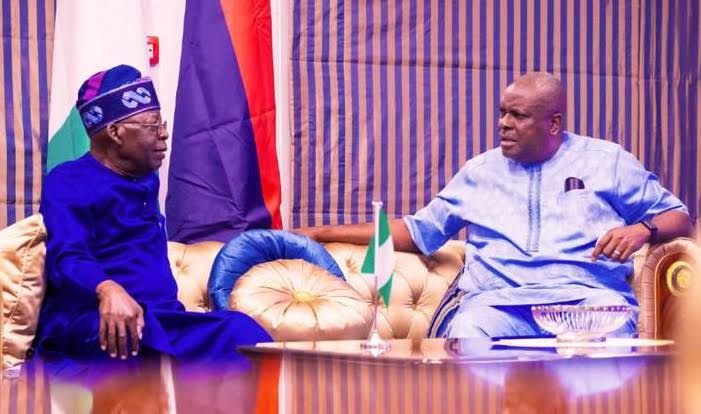Democracy & Governance
LG Autonomy: How True is Ibori’s True Federalism? -By Abdulkadir Salaudeen
Section 162(3) reads: “Any amount standing to the credit of the Federation Account shall be distributed among the Federal and State Governments and the Local Government Councils in each State on such terms and in such manner as may be prescribed by the National Assembly”

President Tinubu regime is synonymous with poverty, unemployment, hyper inflation, criminality, banditry, kidnapping, untold hardship, unprecedented cost of living, and hopelessness. But with the Supreme Court judgement on local government (LG)autonomy, can we say there is hope in hopelessness?
Before Tinubu, former president Buhari signed the Executive Order 10 which granted state legislature and judiciary their stolen autonomy. We all know how it ended. A Supreme Court decision of six Justices to one on February 12, 2022, nullified Buhari’s Executive Order 10.The apex court held that the Order was inconsistent with the 1999 Constitution and therefore unconstitutional, illegal, null and void and of no effect.
President Tinubu—knowing full well that governors will fight back—did not follow the path of his predecessor. He avoided issuing an executive order but went straight to the Supreme Court. He got a judgement in his favor. If it is well managed, the dividends of that victory will hopefully trickle down to the masses at the LG level.
While the Supreme Court judgement is widely celebrated, one might be right to say some governors are already suffering from suffocating migraine. They hate autonomy for LG which they have hamstrung for decades. They are megalomaniac. They stretched their overbearing dominance beyond reasonableness. They are not just political godfathers but idols which must be worshipped. They uprooted governance—almost in its entirety—from the grassroots and turned LG chairmen (or rather caretakers) to dispensable domestic errand boys.
The one in Yobe State just sacked an elected LG chairman for being rude. The one in Kano State insisted on spending LG funds to fund his pet project(flyovers) in the state capital. What of that of Anambra State? He sacked all the LG chairmen whose tenure had been on quarterly renewal basis. That of Oyo State not only sacked LG chairmen, he boasted that he will not pay them until the Supreme Court orders him to do so. Now that the Supreme Court has ordered that they (LG) should be financially autonomous, our governors might need some tutorials, I suggest, on humility.
I am not aware if any of them has reacted to the Supreme Court judgement but I have read the reaction of James Ibori, a former governor of Delta State. Despite being out of government, Ibori seems to be pained by the verdict—though he made some salient points. Alluding to Section 162(3)(6) of the 1999 Constitution as amended, he described the Supreme Court judgement on LG autonomy as a severe setback to the principles of true federalism.
Section 162(3) reads: “Any amount standing to the credit of the Federation Account shall be distributed among the Federal and State Governments and the Local Government Councils in each State on such terms and in such manner as may be prescribed by the National Assembly”
Section 162(6) is even more emphatic. It says: “Each state shall maintain a special account to be called ‘State Joint Local Government Account’ into which shall be paid all allocations to the Local Government Councils of the State from the Federation Account and the Government of the State.”
Thus, according to Ibori, the Supreme Court’s ruling appears to contradict the explicit provisions of Section 162 of the 1999 Constitution. He further claimed that there are only two tiers of government in a federal system and payment of local government allocations to the account of the local governments directly will lead to utter chaos in governance. The judgement, he added, centralises more power at the federal level, contradicts the principles of federalism, amounts to erosion of state autonomy, gives the federal government liberty to retool the LG autonomy to its own political and selfish advantage.
These are Ibori’s grievances; but are they genuine? On the point of joint account which is a constitutional provision, Ibori seems to be right. But why should any serving governor have problem with that? If money that is meant for a joint account and must be transferred to the LG is now being transferred directly to the latter, why should that trouble any patriotic and selfless governor?
Ibori’s claim that federalism is only two tiered (layered) is strange. Perhaps he had the United States in mind.Plus, thedichotomization of federalism into true and false isalsoproblematic. What makes it true or false? Federalism is not an inelastic but a fit-it-all concept. It is two tiers in the United States, it is three tiers in Nigeria (not two, contrary to Ibori’s claim), and it can be four tiers like in Belgium, France, Germany etc.
Ibori’s argument that LG autonomy shall lead to the erosion of state autonomy, chaos in governance, and centralization of more power at the federal level leaves much to be desired. There is need for improvement on that line of thought. Rather than centralization of power, the Supreme Court judgement decentralizes power as it should be in federalism or “true” federalism. And I don’t see any chaos in governance—due to LG autonomy—except if some governors send political thugs on chaotification mission in selected local government areas to prove a point.
By granting autonomy to the LG, is there any sinister motive by the federal government (considering the fact that President Tinubu is master political strategist)or it is just an earnest attempt to bring back the lost governance to the grassroots? Time will tell.
Abdulkadir Salaudeen
salahuddeenabdulkadir@gmail.com










